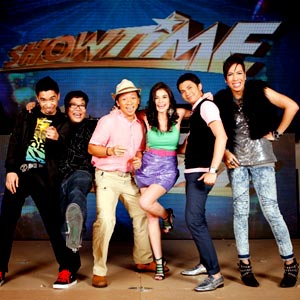One great amusement of going back to visit my folks’ place in New Jersey is their love of Pilipino television. Throughout the day, the television blares a medley of emotive music and phrases in Tagalog. The sounds coming from the TV act almost like an alarm clock; I know what time of day it is, based on which show's opening theme reverberates down the hall.

Growing up, I found Pilipino television to be absolutely maddening. “Teleserye” (or, Pilipino drama series) rotate every few months, though it can be hard to tell one from another. There is always an angel-faced “inosente” who never stops crying versus an angry “contrabida” who can be counted on to throw objects and dirty looks. The variety shows are even more bewildering. Scantily-clad dancers gyrate to repetitive pop songs and hand out prizes during game sequences to modestly-dressed winners hailing from faraway provinces, crying in gratitude to accept their winnings.
“These people are being exploited,” my sister said once, as we watched these shows together with critical eyes. And perhaps that is one reason why Pilipino television was and sometimes still is an outrage to me. There is an exploitive quality to these shows: human emotion and relationships are reduced to banal storylines. Glamour and status are reserved for roles played by actors with perfect pale skin and flawless figures. The true-life stories of the Pilipino working class are only told when contestants become champions in some childish game, and then these heroes-for-a-moment are whisked offstage and forgotten once the segment is over. It concerns me that this is what Pilipino culture looks like to the outside world: an over-the-top circus of nonstop singing, dancing and crying.
When I was younger, I often asked my family what value they saw in these programs. Allow me to paraphrase and translate my grandmother’s elegant reply. She said, “People who watch these have nothing to lose. I see hope when someone wins a prize.”
Now that I haven't been living at my parents' house for quite some time, these TV shows stir up more nostalgia than annoyance. Being home, in front of the TV with my parents is one of the rare times and places that I can listen to Tagalog all day, refreshing my memory and keeping the language alive. I can only imagine the joy and comfort the shows can give to Fil-Ams who had to leave their traditions, families and native tongues behind, like my parents. It’s a link to their home, and it’s become a link to home and roots for me as well.
The existing programs on Pilipino television may not be the perfect or even the best representation of the Pilipino spirit, but it’s the best we've got for now. And there are a handful of shows that convey true stories of Pilipinos of all backgrounds (“MMK” comes to mind). My hope is that the first generation Fil-Am community that I belong to will continue to be critical of Pilipino media. I hope that we'll strive to study the richness of our heritage and history beyond what Pilipino pop culture now offers, branching out to reinterpret what we have to create something even better, and more meaningful for future generations.
